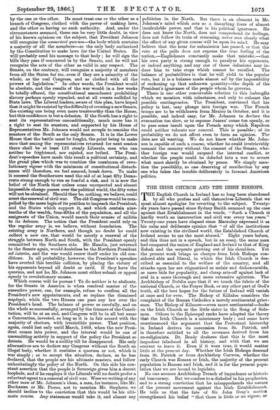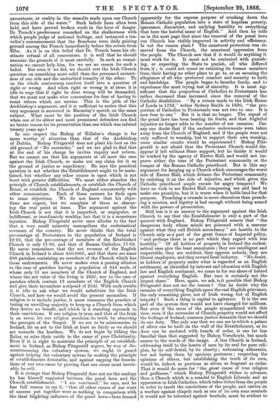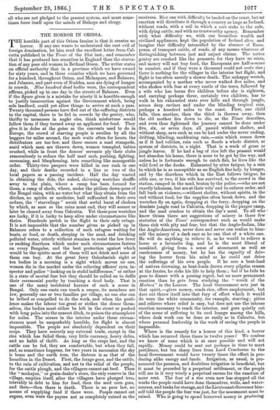THE IRISH CHURCH AND' THE Mar BISHOPS.
THE English Church in Ireland has--so long been abandoned I by all who profess and call themselves Liberals that we must almost apologize for reverting to the subject. Twenty- = years have passed since Sydney Smith summed up the case against that Establishment in the words, "Such a Church is hardly worth an insurrection and civil war every ten years." Twenty-one years have elapsed since Macaulay expressed it as his calm and deliberate opinion that "of all the institutions now existing in the civilized world, the Established Church of Ireland seems to me the most absurd." Eight years before, and this time not in a speech, but in an essay, the flame man had compared the union of England and Ireland to that of King Zohak and the serpents growing out of his shoulders. Yet the present week brings us charges from Irish Bishops con- sidered able and liberal, in which the Irish Church is des- cribed as essential to the welfare of the country, and all attacks upon her are stigmatized as unfair and dishonourable, as mere bids for popularity, and cheap sets-off against lack of zeal in a more thorough and more extensive agitation. The Archbishop of Dublin says that if we touch the fabric of the national Church, or the Prayer Book, or any other part of God,'-a truth, all the best hopes for the future of Ireland will vanish at once and for ever. The Bishop of Rilialoe considers the complaint of the Roman Catholics a merely sentimental griev- ance. The Bishop of Kilmore—even more sentimental—looks on the Irish Church as the little sister in the Song of Solo- Ixton. Others in the Episcopal ranks have adopted the theory that the Irish Church is a missionary body ; and some have countenanced the argument that the Protestant hierarchy in Ireland derives its succession from St. Patrick, and is therefore entitled to all the revenues derived from his co-religionists. Dr. Brady declares that this is the most impudent falsehood in all history, and with that we are c-ontent to leave it. Even if it were true, it would matter little at the present day. Whether the Irish Bishops descend from St. Patrick or from Archbishop Curwen, whether the early Church was Roman or Irish, the majority of the present population is Roman and Irish, and it is for the present popu- lation that we are bound to legislate.
No one accuses Archbishop Trench of impudence or histori- cal inaccuracy. But we confess to a disbelief in his prophecies,
and to a strong conviction that he misapprehends the nature of the present movement against the Irish Establishment. He tells 1113 that the fate of Sir John Gray's motion strengthened his belief " that there is little or no vigour, or
earnestness, or reality in the assaults made upon our Church from this side of the water." Such beliefs have often been held, and have proved broken reeds in the hour of danger. Dr. Trench's predecessor remarked on the shallowness with which people judge of national feelings, and instanced a tra- veller's announcement that the Bourbons were daily gaining ground among the French immediately before the return from Elba. As it is on this belief that Dr. Trench bases his ob- stinate refusal of all concessions, it is well that he should examine the grounds of it most carefully. In such an exami- nation we cannot help him, for we see no reason for such a belief. But even if we did, we should rest the Irish Church question on something more solid than the presumed earnest- ness of one side and the undoubted tenacity of the other. To us the whole controversy resolves itself into a question of right or wrong. And when right or wrong is at issue, it is idle to urge that if right be done wrong will be demanded, that we must not make wise concessions for fear of having to resist others which are unwise. This is the pith of the Archbishop's argument, and it is sufficient to notice that this very argument is answered in Macaulay's speech on the same subject. What must be the position of the Irish Church when one of its ablest and most prominent defenders can find no better reason for its preservation than one which was refuted twenty years ago ?
In one respect the Bishop of Killaloe's charge is far more worthy of attention than that of the Archbishop of Dublin. Bishop Fitzgerald does not plant his foot on the old ground of "No surrender," and we are glad to find that at the end of his charge he invites inquiry and reform. But we cannot see that his arguments at all meet the case against the Irish Church, or make out any claim for it on the ground of justice or expediency. He says the practical question is not whether the Establishment ought to be main- tained, but whether any other course is open which is not beset with greater difficulties. We must either abandon the principle of Church establishments, or establish the Church of Rome, or establish the Church of England concurrently with other communions. Each of these courses he finds open to some objections. We do not know that his objec- tions are cogent, but we complain of them as obscur- ing the real point at issue. The argument against the Irish Church is not that it is imperfect, or unpopular, or indifferent, or inordinately wealthy, but that it is a monstrous injustice. Bishop Fitzgerald never once alludes to the fact that a very small minority monopolizes the ecclesiastical revenues of the country. He never thinks that the total per-centage of Protestants to the population of Ireland is 22.23, that the per-centage of members of the Established Church is only 11.96, and that of Roman Catholics, 77.69. He never remembers that the net revenue of the English Church in Ireland is about 450,0001., and that there are some 200 parishes containing no members of the Church which has these endowments. He never makes even a passing allusion to the case of parishes having a population of 644 souls, of whom only 31 are members of the Church of England, and where the net value of the living is 266/., nor to the case of parishes which contain 13 members of the English Church and give their incumbent a stipend of 254/. With such results it is idle to ask what we would substitute for the Irish Church, and how we would avoid the present anomalies. If religion is to include justice, it must renounce the practice of taxing an unwilling majority to keep up a Church from which they derive no benefit, and which is a standing reproach to their convictions. If our religion is true, and that of the Irish is an error, let our religion proclaim its truth by observing the precepts of the Gospel. If we are to be missionaries in Ireland, let us act to the Irish at least as fairly as we should act towards the heathen. We do not begin by tithing the Zulus, or seize their cattle in the name of pure Christianity. Even if it is right to maintain the principle of an establish- ment in Ireland, as Bishop Fitzgerald argues, by way of dis- countenancing the voluntary system, we ought to guard against helping the voluntary system by making the principle of establishments detestable, and against sapping the founda- tions of our own cause by proving that our cause must inevit- ably be evil.
It is strange that Bishop Fitzgerald does not see the analogy he has himself suggested between the penal laws and the Church establishment. "I am convinced," he says, and he has full reason to say it, "that all other causes of our want of success put together were as nothing in comparison with the fatal blighting influence of the penal laws—laws framed
apparently for the express purpose of crushing down the Roman Catholic population into a state of hopeless poverty, ignorance, discontent, and undying hostility to everything that bore the hateful name of English." And then he tells us in the next page that since the removal of the penal laws our Church has visibly improved in activity and efficiency. Is not the reason plain ? The unnatural protection was re- moved from the Church, the unnatural oppression from the people. The Church saw that if it would do anything it must work for it. It must not be contented with punish- ing, or expecting the State to punish, all who differed from it ; it could not count on retaining its former members from their having no other place to go to, or on securing the allegiance of all who preferred comfort and security to faith and hardships. The people began to breathe freely, and to experience the most trying test of sincerity. It is most sig- nificant that the proportion of Catholics to Protestants has rather decreased than increased since the removal of the Catholic disabilities. "By a return made to the Irish House of Lords in 1732," writes Sydney Smith in 1820, "the pro- portion of Catholics to Protestants was not two to one. It is now four to one." But it is that no longer. The repeal of the penal laws has been bearing its fruits, and that frightful injustice no longer adds to the number of our enemies. Can any one doubt that if the exclusive endowments were taken away from the Church of -England, and if the people were not only suffered to worship, but to support their own worship, some similar results would be experienced? Bishop Fitz- gerald is not afraid that the Protestant Church would dis- appear if left without State support, but he thinks it would be worked by the agency of Exeter Hall, and would not im- prove either the tone of the Protestant community or the temper of the Roman Catholic priesthood. But is this any argument for keeping up a Church which encourages the worst side of Exeter Hall, which debases the Protestant community by enlisting it on the side of injustice, and which gives the Catholic priesthood ample excuse for angry tempers? We have no wish to see Exeter Hall compassing sea and land to make one proselyte, but it is worse when it holds land for that purpose. Preaching a crusade is more obnoxious than preach- ing a mission, and bigotry is bad enough without being armed with the powers of persecution.
Still less is it an answer to the argument against the Irish Church to say that the Establishment is only a part of the quarrel with England. Bishop Fitzgerald asserts that "the dangerous body whose minds are poisoned with a rancour against what they call British ascendancy" are hostile to the Church only as a part of the great frame of Imperial policy, "and perhaps there is no part which they regard with less hostility." Of all holders of property in Ireland the ecclesi- astical ones give the least annoyance ; they are intelligent and respectable, they are resident, they oppress nobody, they are liberal employers, and they reward local industry. "No doubt, as holders of property under what is regarded as an English settlement, as identified by interest and education with English law and English sentiment, we come in for our share of hatred against everything English. But ours is certainly not the largest share." Here, again, we ask, is it possible that Bishop Fitzgerald does not see the reason ? Can he doubt why the enemies of everything English spare the real English grievance, the only remaining piece, not of Irish wrong, but of English iniquity? Such a thing is capital to agitators. It is the one part of the system they would not have changed for millions. But even if the mass of the people sympathized with this view, even if the surrender of Church property would not affect the feelings of Ireland, common justice demands that we should do our duty. Tha Only way that we can see in which a palace of silver can be built on the wall of the Establishment, or its door can be enclosed with boards of cedar, is one far less fanciful than that suggested by Bishop Verschoyle, but much nearer to the words of the image. A free Church in Ireland, addressing itself to the hearts of men by its zeal for pure reli- gion, by its self-denial, by its charity ; welcoming adherents, but not luring them by specious pretences ; respecting the opinions of others, but establishing the truth of its own, would be, indeed, as precious as silver, as fragrant as cedar. That it would do more for "the great cause of true religion and godliness," which Bishop Fitzgerald wishes to advance, than a Church which is a scandal to English Liberals and an oppression to Irish Catholics, which takes tithes from the people in order to insult the convictions of the people, and carries on a warfare against chapels such as one of its own sons reminds it would not be tolerated against brothels, must be evident to
all who are not pledged to the present system, and must some- times force itself upon the minds of Bishops and clergy.
































 Previous page
Previous page